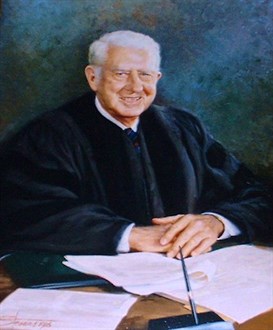
The Hon. Ted Dalton Biography
Theodore Roosevelt Dalton, known throughout his life as Ted, was born in Carroll County, Virginia on July 4, 1901. He died in Radford, Virginia on October 30, 1989.
Ted was raised on a farm in Carroll County, Virginia and was a successful farmer throughout his life. He was a graduate of the College of William and Mary and its Marshall Wythe School of Law. His excellence in academic studies won for him membership in Phi Beta Kappa, and his traits of leadership, a membership in Omicron Delta Kappa.
He was a member of the Virginia State Bar from 1923, and engaged in the general practice of law in Radford, Virginia from that time until his appointment by President Eisenhower as a United States District Judge for the Western District of Virginia in 1959.
He was a life-long member of the First Baptist Church, and served on its board of deacons and as a trustee of the church. He was active in the Boy Scouts of America for many years, and was instrumental in securing the Camp Powhatan Reservation for that organization, which is today the largest Scout reservation in America.
He was elected and served one four-year term as Commonwealth Attorney for the City of Radford beginning in 1933. He served in the Virginia General Assembly as a state senator front 1945 until his appointment to the federal bench.
Ted was the Republican candidate for governor of Virginia in 1953 and again in 1957. He also served on the Republican National Committee as a representative from 1952 until 1959.
Ted was married to Mary Turner Dalton in 1932 and they had one son, John Nichols Dalton, who served as governor of Virginia from 1978 until 1982. The judge was preceded in death by his wife and son, but he left surviving him four grandchildren and five great grandchildren.
He genuinely loved people, and in return was loved and admired by people in all stations of life: the rich, the poor, the educated, the uneducated. All felt comfortable around him and counted him as their friend.
Judge Dalton was a man of academic wisdom, but one always conscious of reality. He was a great proponent of the common sense approach. Ted was a man of high accomplishment in his chosen work as a lawyer and as a judge, but outstandingly successful in other fields and avocations.
He was a man of high personal ideals, and for whom the idea of a better state and nation was paramount.
Ted knew the rough and tumble of politics, but it never stained him. It was on the basis of sheer ability and integrity that he was appointed to the bench for the Western District of Virginia.
In his decisions during more than 25 years on the bench of the United States District Court, he ruled in accordance with the concept of pure justice that transcends the swinging pendulum of public opinion or the dictates of narrow judicial precedent. He understood that in a nation governed by laws and not by men there was placed in the hands of the court the opposing powers of salvation and destruction.
Throughout his career his personal philosophy and official actions portrayed a firm adherence to the constitutional precepts, a consistent dedication to the conscientious interpretation of the law, and a careful avoidance of the temptation to legislate by judicial decree.
His concepts of the government's role in providing an educational opportunity for all of our children, which he advocated prior to taking his seat on the federal bench, were ahead of his time. But he lived to see the idea that he espoused effected by those who followed him in governmental service.
Governors, personal friends, public and private agencies, alike, leaned heavily upon him for advice and assistance, and his influence is evident today in the many facets of the judicial system, and the statute of the legal profession, itself, and in many other areas of public service.
His talent for resolving the most complex cases quickly while preserving justice is, and likely will remain, unsurpassed.
His life exemplifies the highest, best and most decent aspirations of our society. In his death Virginia lost a favorite son, the federal judiciary lost one of its finest judges, and the country lost a true statesman.
The foregoing was written by Judge James C. Turk for the Fourth Circuit shortly after Judge Dalton's death.
